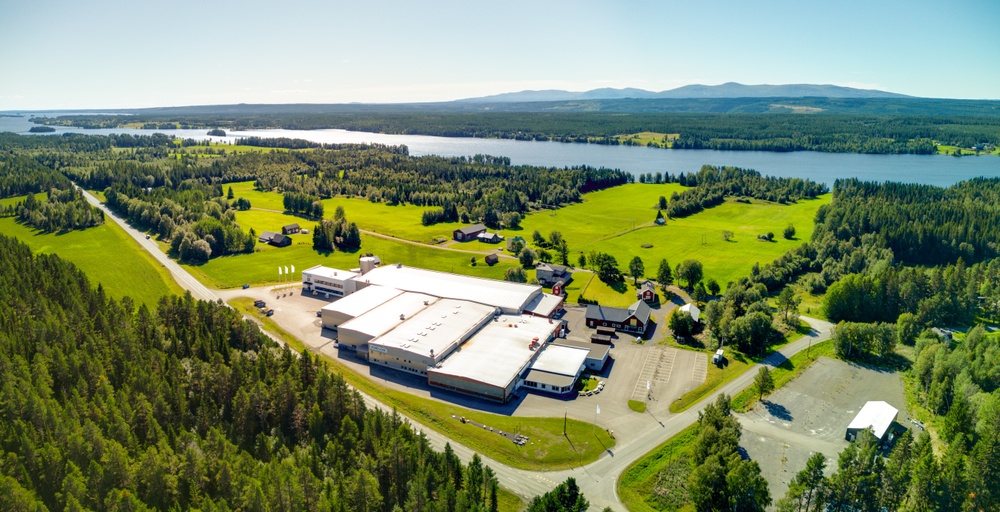Nord-Lock Group’s science-based targets approved
 Nord-Lock washer production facility in Sweden
Nord-Lock washer production facility in SwedenFollowing an extensive period of analyzing carbon emissions of each of its four technology brands, Nord-Lock Group succeeded in developing specific near- and long-term greenhouse gas (GHG) emissions reduction targets that align with the UNFCCC Paris Agreement. Now, Nord-Lock Group is delighted to announce that the submitted targets have been approved by the Science Based Targets initiative (SBTi).
Approved SBTi targets are the next step on the journey to reducing GHG emissions, a journey that began when Nord-Lock Group launched an official sustainability improvement program in 2019.
The science-based targets define how much and how fast companies must reduce GHG emissions over the next 5-10 years to become net zero by 2050 and align with the 1.5°C target defined in the UNFCCC Paris Agreement. For Nord-Lock Group, the science-based targets provide further direction in the existing strategic planning of developing and executing efficient climate change mitigation actions for operations and products.
A breakdown of the near and long-term targets
Looking at Nord-Lock Group’s science-based near-term targets, these are formulated as follows:
-
Reduce absolute scope 1 and 2 GHG emissions by 58.8% by 2034 from a 2022 base year.
-
Reduce scope 3 GHG emissions by 58.8% by 2034 from a 2022 base year.
Turning to the long-term net-zero science-based targets, Nord-Lock Group commits to:
-
Reduce absolute scope 1 and 2 GHG emissions by 100% by 2050 from the 2022 base year.
-
Reduce scope 3 GHG emissions by 92% by 2050 from the 2022 base year.
Reduction strategies to reach science-based targets varies between companies and industry sectors, and several opportunities can be of interest throughout the value chain. Reduction strategies to reach science-based targets vary between companies and industry sectors, and several opportunities can be of interest throughout the value chain. For Nord-Lock Group, the following actions are projected to provide the most impactful results: Scope 1 and 2 emissions will be reduced mainly by minimizing natural gas heating in the premises and sourcing 100% renewable electricity and district heating. Scope 3 emissions will mainly be reduced by purchasing low-carbon or recycled steel and by reducing air freight when sourcing materials and delivering ready products to customers.
When reaching a 92% actual reduction in 2050, the remaining 8% of emissions to reach net zero will be reduced by climate compensation actions following the upcoming guide developed by SBTi.
“The fact that our targets are validated by the Science Based Targets initiative is yet another significant step in our existing, ambitious program addressing climate change. We will now be well-equipped to deepen our sustainability conversations and partnerships with customers and suppliers” – Daniel Westberg, CEO at Nord-Lock Group.
Work has already begun
To develop a detailed plan to meet the approved targets of SBTi, Nord-Lock Group has already started to implement climate change mitigation actions across all business units. Some of the GHG-emission reduction projects that the business units are actively working on include:
-
Sourcing renewable electricity
-
Transitioning to renewable fuels for their car fleet
-
Optimizing production processes
-
Increasing the internal circularity of waste
-
Sourcing low-emission and recycled steel for products
-
Reducing air freight
Positive results from efforts aimed at reducing climate emissions have already started to show, as evidenced by a 26% reduction in total CO₂ emissions compared to 2023, including:
-
A 14% reduction in Scope 1 emissions
-
A 40% reduction in Scope 2 emissions
“Addressing climate change by limiting GHG emissions from our production sites and value chain has been a key issue since the earliest days of our sustainability program. With approved science-based targets, we can focus our efforts with even more precision to reach net-zero emissions by 2050” – Christina Hansson, Chief Sustainability Officer at Nord-Lock Group.
Access the full validation report here.
About the Science Based Targets Initiatives
The Science Based Targets initiative (SBTi) is a global body enabling businesses to set ambitious emissions reduction targets in line with the latest climate science. It is focused on accelerating companies across the world to halve emissions before 2030 and achieve net-zero emissions before 2050.
The initiative is a collaboration between the Carbon Disclosure Project (CDP), the United Nations Global Compact, the World Resources Institute (WRI), and the World Wide Fund for Nature (WWF), and is one of the We Mean Business Coalition commitments. The SBTi defines and promotes best practices in science-based target setting, offers resources and guidance to reduce barriers to adoption, and independently assesses and approves companies’ targets.
About Nord-Lock Group
The Nord-Lock Group believes that no one should have to question the integrity of the mechanical systems that play such a critical role in our way of life. As a global leader in bolting solutions, we strengthen public and industrial infrastructures with high-quality, safe and innovative solutions that will change the face of modern living for decades to come.
